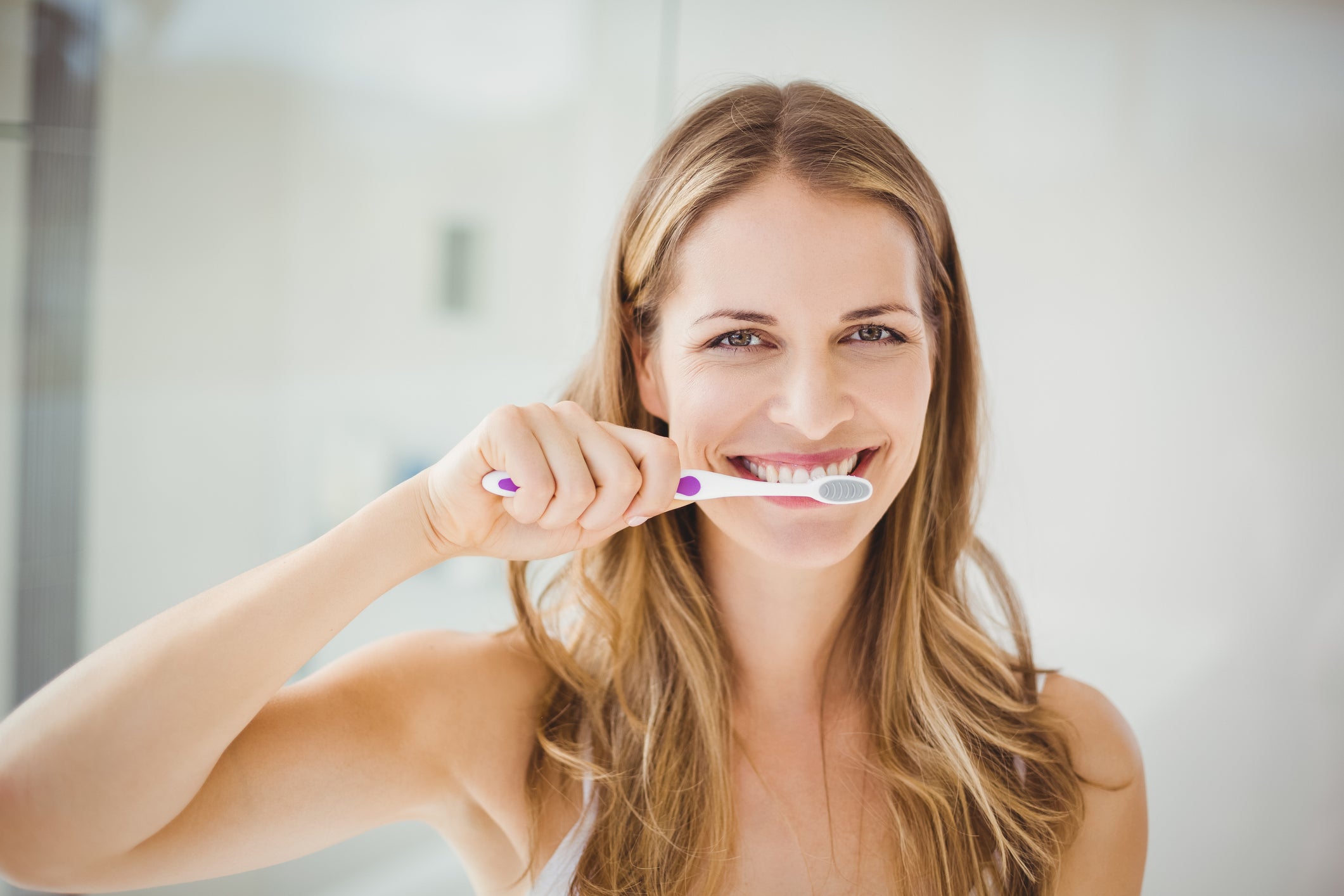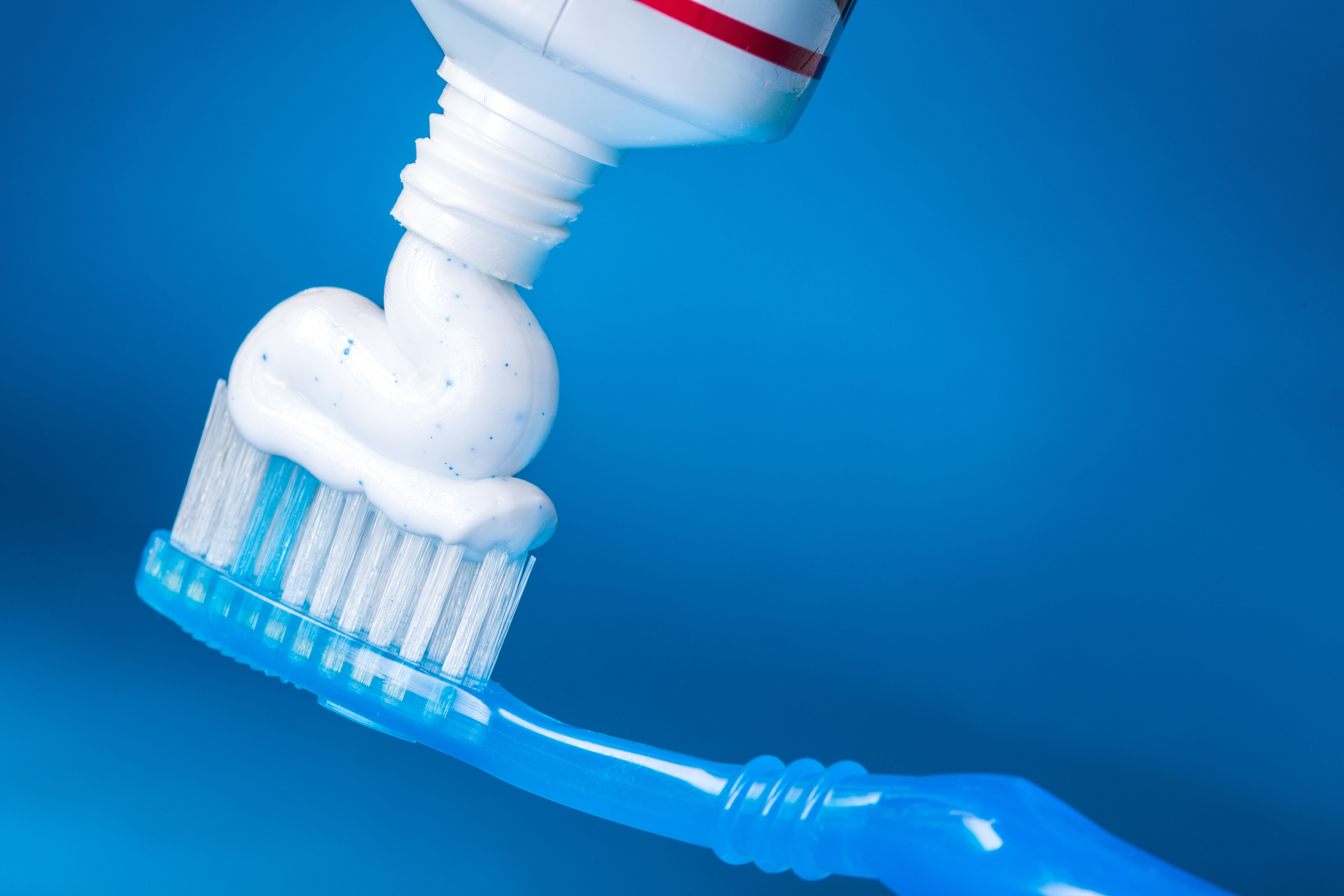-
Can Root Canals Last a Lifetime?
Root Canals, a Tooth-Saving Procedure
A root canal is a standard dental procedure intended to rescue teeth that have become badly infected or significantly decayed. However, patients often wonder: how long does a root canal last? Understanding the factors that influence the permanence of a root canal and the steps that can be taken to maximize its lifespan is crucial for maintaining oral health and making educated decisions about dental care. Continue reading “Can Root Canals Last a Lifetime?”
-
The Benefits of Good Oral Hygiene Habits

Young woman with good dental hygiene habits.
We know a lot about the fact that it’s important to keep a clean mouth. We also know that the way to a clean mouth is by brushing, flossing, and regular dental visits. What are the reasons we want to keep a clean mouth? Here are some facts about oral hygiene, including some tips you may not have known about keeping those pearly whites nice and healthy!
- Keeping Your Teeth
This one may seem obvious, but some people don’t realize how easy it is for teeth to fall out of an unhealthy smile. It’s not only tooth decay, but there are other ways you can easily lose teeth. Gum disease is another way that teeth can fall out. We need our teeth to enjoy those delicious, healthy foods. Not only that, those who keep all of their teeth for life are likely to live longer than those without all of their 20 teeth. So do your best to keep a clean mouth and healthy teeth. - Lowers Risk of Sickness and Disease-This is a big one. Did you know that keeping your teeth clean can greatly reduce your risk of serious illness? It’s a fact. Here are some facts about disease that you maybe didn’t know.
- Covid-Recent studies have shown that keeping your mouth clean can reduce your risk of suffering a fatal outcome from covid. Keep your mouth clean and reduce your risks.
- Heart Disease-Gum disease and periodontal disease have been linked to heart disease according to the CDC. It is theorized that bacteria from the gums enter the bloodstream and affect the cardiovascular system.
- Cancer-As if that weren’t enough, gum disease has been linked to certain cancers as well. In fact, those with gum disease are 14% more likely to experience some form of cancer in their lifetime. Those with gum disease are more likely to develop gall bladder cancer, breast cancer, esophageal cancer, and skin cancer.
- Dementia-Another big one, this one is hard to hear. But there is a 70% greater chance of developing dementia for someone who has unhealthy gums than for someone who has healthy gums. Gum disease is a very serious affliction.
- Having a Healthy Baby
Moms who have healthy mouths are much less likely to have premature babies or babies with low birth weight. If you are pregnant, keep those teeth nice and clean and you will increase your beautiful baby’s chance at a healthy birth. - Staying Gorgeous
Keeping all your teeth means you’re just one step closer to lifelong beauty. Regular brushing, flossing, and dental exams will help you keep the wonderful smile you were born with and that is very important. Whether it’s a first date, a job interview, or your first day at college, having a healthy and attractive smile means you’re able to put your best foot forward in every situation.
Park 56 Dental
When you are looking for the best advice about how to keep a healthy mouth and a healthy body the best place in New York is Park 56 Dental. Voted the number one dentist in the New York area, we have everything you need for perfecting that beautiful smile. For more information about or to ask any questions about your teeth, visit our website or give us a call at (646) 679-3973. - Keeping Your Teeth
-
The Impact of Lifestyle On Your Dental Health

Eating well for healthy teeth.
How Lifestyle Impacts Your Dental Health
We are all constantly trying to improve our lifestyle choices. The focus on health is one that is unprecedented in prior generations. We work out, eat right, and even try to exercise our brains. How do these lifestyle choices affect our dental health? Here are some ways.
- Dietary Choices
We’ve all heard that you are what you eat. Your teeth are also a reflection of what you are putting in your body. When you eat foods that are high in sugar for example, you are very likely to suffer from tooth decay. If you consume acidic beverages, you may have damage to the enamel of your teeth. Eating a diet rich in vitamins and minerals includes foods like lean proteins, fruits, and vegetables. In addition, calcium rich foods are important to consume for optimal dental health. All dairy products contain calcium which is essential to healthy teeth and bones. - Tobacco Use
How many more ways can we say this? Tobacco use is the worst thing you can do for your health and therefore it’s also the worst thing you can do for your teeth. Smoking stains the teeth, causes bad breath, causes gums to recede, and can even cause tooth loss. Just don’t do it. No tobacco use, please. - Alcohol consumption
Alcohol consumption is ok in moderation. However, alcohol use can cause dehydration and that can mean dry mouth. When saliva flow is reduced the mouth becomes a breeding ground for bacteria. This means that tooth decay is imminent. So, if you do drink, make sure to hydrate. And please don’t combine alcohol with tobacco. This increases the negative effects of both. - Hydration
On that note, let’s talk hydration! Keep the H2O flowing, and you will slowly be removing food and debris from the mouth between brushing. Not only that, drinking water increases the flow of saliva in the mouth and saliva protects the teeth and helps clean the mouth by breaking down particles and bacteria. - Stress
Being stressed alone has little effect on your teeth. However, people under stress usually clench their jaw or grind their teeth. The person who does this is usually not even aware it is happening. This means that teeth could be suffering damage while we sleep. Try meditative exercises and try to keep stress to a minimum. - Regular Dental Checkups
It’s essential to your dental health that you regularly visit your dentist. From regular dental cleanings to x-rays and regular exams, you can’t go wrong having regular dental cleanings and checkups. In fact, you can ask your dentist for more tips on a healthy lifestyle that promotes a healthy smile.
Park 56 Dental
When you are looking for the best advice about how to keep a healthy mouth, the best place in New York is Park 56 Dental. Voted the number one dentist in the New York area, we have everything you need for perfecting that beautiful smile. For more information about keeping good oral hygiene habits to promote a healthy lifestyle or to make an appointment, visit our website or give us a call at (646) 679-3973. - Dietary Choices
-
Everything You Need To Know About Dental Implants

Young woman confident about her smile.
What are Dental Implants?
Whether you’re talking about veneers, bridges, or crowns, dental implants are prosthetic teeth that are permanently secured into the mouth. They are a great solution for people who have one or more missing teeth.
The bottom line is that if you have missing teeth, they must be replaced as soon as possible. It is essential to have all your teeth. If one tooth goes missing, your bite will be compromised, and more teeth could suffer from that misalignment. Not only that, a missing tooth is unsightly. Let’s go over all the information concerning dental implants.
What are Implants Made Of?
Dental implants are created using ceramic and metal together to craft a tooth that looks nearly identical to the original tooth. A dentist can craft teeth out of these materials and even match the color of your other teeth. Some dental implants are made from titanium or zirconium oxide. Some implants are made of gold alloys, or cobalt-based alloys.
Implants are made of three parts:
- Implant Body: This is a piece made of metal that is screwed into the gums and fixed to the jaw.
- Abutment: An abutment is fixed into the screw and is meant to secure the new prosthetic tooth.
- Crown: The crown is the ceramic and metal piece that fits onto the abutment. This is what will look exactly like your old tooth.
Are You a Candidate for Implants?
You may be a candidate for dental implants. There are many factors that will affect your candidacy. These factors include:
- Are you missing at least one tooth?
- Are you healthy enough for surgery?
Receiving implants means going under sedation and it requires oral surgery. If your body isn’t healthy enough for surgery, you are not a candidate for dental implants. - Did you lose your tooth or teeth due to gum disease? If the answer to this question is yes, you aren’t a candidate for dental implants. But never fear! If you get that gum disease under control, you will be able to eventually be a candidate for dental implants.
What are the Pros and Cons of Dental Implants?
Pros:
- Appearance-Cosmetically, implants are likely to look more like your original teeth. This is why some people prefer them to dentures or just leaving the tooth missing.
- Keeps the surrounding bone and gums healthy-When you lose a tooth and receive a dental implant, the surrounding teeth, jaw, and gums recognize it and don’t wither away, like they would do if you left the space empty.
- Keeps nearby teeth stable-nearby teeth are less likely to shift when there is a replacement tooth.
- The ability to chew is preserved-This is the most practical reason to get dental implants.
Cons:
There are no real cons to getting dental implants. There are however some risks involved.- Possible harm to surrounding teeth during insertion.
- Shifting of teeth or changes to bite.
- Implant failure-sometimes the implant doesn’t work like it should or it comes out.
- Gum damage-Dental implants can sometimes cause gums near the tooth to become less healthy tissue.
- Issues with cleaning around implant, possibly leading to the loss of other teeth.
- Numbness after surgery
Conclusion:
Dental implants can be a wonderful solution to a missing tooth or missing teeth. They are a particularly positive choice for someone who has one to several missing teeth, but not completely missing teeth. They can boost confidence, improve bite, and complete your smile.
Park 56 Dental
If you are thinking about dental implants or other dental procedures, the best place in New York is Park 56 Dental. Voted the number one dentist in the New York area, we have everything you need for perfecting that beautiful smile. For more information about dental implants or to ask any questions about your teeth, visit our website or give us a call at (646) 679-3973. -
The Hidden Dangers of Not Addressing Dental Problems

Woman addressing dental issues.
Taking care of our oral health seems like a basic task that most of us brush off as unimportant. But did you know that the health of your mouth and teeth is intricately connected to the health of your entire body? It is true- dental problems can cause serious, sometimes lethal, health issues. In this blog, we will discuss how neglecting dental problems can lead to severe health concerns and how to prevent them.
How Are Oral and Systemic Health Connected?
The truth is that your mouth is a prime entry point for bacteria and germs. These harmful microorganisms can infiltrate your bloodstream, creating health problems in your body. In fact, according to the American Dental Association, studies have shown that there is a link between stroke, diabetes, heart disease, preterm labor and birth weight, and bacterial infections that start in the mouth.
Your Immune System
A robust immune system is pivotal in fighting pathogens and infections that may be present in our bodies. By neglecting dental problems, we weaken our immune system, which exposes us to dangerous diseases and health issues. Poor oral health can strain our immune system, leaving it less equipped to fight off harmful invaders like bacteria or viruses.
Inflammation
Stress, unhealthy diets, and infections in your gums and teeth can cause inflammation throughout your body. Inflammation is the body’s natural response to injury or infection. However, chronic inflammation is harmful and can lead to bigger health issues such as cancer, heart disease, stroke, and diabetes, to name a few. The link between oral health and inflammation makes it crucial to take care of our dental issues, both big and small.
The Stages of Gum Disease and Its Threat to Overall Health
Gum disease, also known as periodontal disease, is a serious problem that affects the soft tissue and bone that supports your teeth. Gum disease is prevalent, affecting nearly half of adults over the age of 30 in the United States, according to the Centers for Disease Control and Prevention (CDC). While many may think gum disease is just a minor dental issue, it can cause significant health problems if left untreated. Gum disease can lead to tooth loss, chronic bad breath, and has links to heart disease, stroke, and diabetes.
How to Practice Preventive Dental Care and Why
The best way to avoid the dangers of neglected dental problems is to practice preventative dental care. Regular brushing and flossing, cleaning your tongue, maintaining a healthy diet, and visiting your dentist at least once a year can prevent dental problems from occurring. Brushing and flossing help remove plaque that can cause cavities, gum disease, and bad breath. Regular visits to your dentist enable them to detect and treat any oral health issues, prevent tooth decay, and gum disease, prevent oral cancer, and keep your teeth and gums healthy.
Make an Appointment Today with Park 56 Dental
It is imperative to take good care of your teeth to avoid any dental problems that could lead to significant health issues. By brushing and flossing regularly, eating a healthy diet, and visiting your dentist regularly, you can help reduce the risk of alarming health problems. At Park 56 Dental, our team of experts is committed to helping you maintain your optimal oral health. Contact us today to schedule your consultation.
-
Why Regular Dental Check-Ups are Essential for a Healthy Smile

Patient getting dental check-up.
Maintaining a beautiful and healthy smile begins with your daily dental routines of brushing and flossing. Yet even the most thorough approach to oral hygiene also requires frequent dental check-ups. Here’s why:
- Early Detection of Dental Issues
Even if nothing seems out of the ordinary, dental problems can sometimes develop without any noticeable symptoms in their early stages. Regular checkups can give your dentist the chance to identify cavities, gum disease and oral cancer at early stages, which can make them more manageable.
- Professional Cleaning
Brushing and flossing alone can’t remove all plaque and tartar buildup. Your dentists at Park 56 can perform thorough cleanings to remove these deposits, helping to reduce the risk of cavities and gum disease.
- Oral Hygiene Education
You may need personalized advice on improving your oral hygiene regimen. Your dentist and hygienist can assess the work you do at home and provide you with tips on how to improve your brushing and flossing techniques. They might also recommend new products or technologies that could be beneficial for your specific needs.
- X-rays and Diagnostic Tools
Special diagnostic equipment can help shine a light on things that you might not be able to detect at home. Hidden cavities, impacted teeth, or bone loss might be lurking out of sight, but regular annual X-rays can give you an inside look to be able to diagnose and repair an issue before it becomes a serious problem.
- Gum Health Assessment
Gum health is an indicator of overall dental health. Early screening and detection of gum disease can provide you with treatment necessary to prevent tooth loss and other problems. Your dentists at Park 56 can assess your gums and help treat or prevent gum disease before it starts.
- Preventing Complications
Regular dental analysis can keep your medical records up to date on your past issue, ensuring that your treatment plan is current and effective. This can give your dental team the opportunity to monitor your progress and maintain a treatment plan that can lead to total wellness and save you time and money on more extensive remedies.
- Oral Cancer Prevention
Your dentist is trained to detect the early signs of oral cancers during routine exams. Anyone can become susceptible to mouth cancers but patients who smoke tobacco or drink alcohol are especially at risk. Early detection can make treatment easier and less invasive, significantly improving chances of successful treatment.
- The Personal Touch
Your dental team at Park 56 take a personal approach to every patient. We take the time to get to know you, your dental history, your lifestyle and your unique needs. Whether you need a simple cleaning, a filling, oral surgery, prosthodontics, sedation dentistry, endodontics, or Invisalign, our dental specialists can customize an immediate and ongoing treatment plan to fit your needs.
Regular dental screenings are essential to your overall oral hygiene plan, and the experts at Park 56 can help you make sure you are staying on track and maintaining your dental health. Give us a call and schedule your next appointment today so you can keep your smile shining bright.
-
The Link Between Oral Health and Overall Well-Being

Woman caring for her dental health.
Good dental hygiene provides an extra boost of confidence. It’s easy to smile and share in conversations when you know your teeth are at their best. But aesthetics isn’t the only reason that you should be keen on keeping your mouth spic and span. Your overall wellness can depend on good dental routine, along with regular checkups and cleanings at your dentist. Let’s look at some of the different ways a healthy mouth can help you live a better life.
A Stitch in Time
Maintaining good dental hygiene practices, such as daily brushing and flossing, combined with regular dental checkups, can help you avoid issues such as cavities, gum disease and tooth decay. Left unchecked, these conditions can worsen to discomfort, infection, and tooth loss. Taking a proactive approach to your dental routine is the best way to stop problems before they can start.
Good For the Wallet
Fixing a serious dental problem is much more expensive than preventing the problem in the first place. The average root canal can cost anywhere from $700 to upwards of $2,000, depending on the tooth location. Dentures or dental implants cost even more. You can save yourself a headache, and a toothache, by proactively engaging in good dental hygiene.
For Your Health
Bad dental hygiene has been linked to serious health problems. Mouths are full of various types of bacteria, most of them harmless. But bacterial buildup from gum disease can contribute to bacteria entering the bloodstream and causing endocarditis, an infection of the inner lining of the heart’s chambers and valves. There is also a link between cardiovascular disease and gum disease, though scientists do not yet fully understand the connection. Inhaling the excess bacteria resulting from poor dental hygiene can even lead to respiratory disease and pneumonia.
Communication Matters
Your smile isn’t just for show; it’s an essential tool for communication. Dental problems like missing teeth can affect the way you talk, potentially causing confusion and eroding your social confidence. Maintaining proper oral health can help ensure your message stays on track.
Mental Health
Experiencing pain in your mouth is more than just an inconvenience. Dental problems can cause psychological issues and result in lower feelings of self-worth. On the other hand, a healthy smile can boost your confidence and increase your overall happiness.
Looking Out for Baby
For expectant mothers, oral health during pregnancy is crucial. Poor oral health has been associated with preterm birth and low birth weight. Hormonal changes during pregnancy can make women more susceptible to dental issues, underscoring the importance of dental care during this critical time.
The link between good oral health and overall well-being is undeniable. It’s not just about a dazzling smile; it’s about your physical, mental, financial, and emotional health. Park 56 Dental is here to be your partner in dental wellness. Voted NYC’s best dentist, we specialize in pediatric, prosthodontics, endodontics, oral surgery, Invisalign®, emergency, and sedation dentistry. Don’t skip those dental appointments. Keep up with your daily oral hygiene routine and address any oral health concerns promptly. Your smile reflects your overall well-being, so let us help you make it a healthy one.
-
How Chronic Illnesses Can Affect Oral Health
 Woman taking care of dental health by brushing teeth.
Woman taking care of dental health by brushing teeth.Oral Health and Overall Health
Did you know that the health of your mouth and the overall health of your body are connected? In fact, there is a bidirectional relationship between chronic illness and oral health. Some chronic diseases are directly associated with oral health issues, either causing or being caused by them. In other cases, there’s an indirect relationship, or shared risk factors. Let’s take a look at how chronic illnesses can affect oral health.
Chronic Diseases are Leading Causes of Death and Disability
Conditions like diabetes, heart disease, respiratory disease, cancers, and obesity can all be linked with poor oral health. Because oral health conditions are often chronic, they can happen alongside other chronic conditions. Unfortunately, people with more than one chronic condition tend to have worse long-term health outcomes than those who only have one chronic condition. Prevention is the key to good health, and maintaining good oral health care can help prevent chronic diseases or improve the outcome for those who suffer from them.
Preventing Gum Disease Can Improve Health
Gum disease is very common, affecting about 75 percent of adults in the United States. If left untreated, gum disease can advance and increase the risk of serious health issues, like diabetes, heart disease/stroke, lupus, oral cancer, organ transplant, and rheumatoid arthritis. Fortunately, when detected early, gum disease can be reversed through good oral hygiene and regular dental care.
How Different Conditions are Connected
- Diabetes, periodontal disease, and tooth decay are interconnected. Though more research is needed, there is evidence to suggest that periodontal disease and tooth decay can exacerbate type 2 and gestational diabetes. This probably occurs because these conditions increase inflammation and blood sugar levels. By the same token, people who have diabetes are at higher risk of infections that can cause tooth decay and periodontal disease.
- Oral health issues may be associated with heart disease. Studies show that periodontal disease and tooth decay may increase a person’s risk of heart disease, or worsen existing heart conditions, by causing inflammation and damaging blood vessels.
- Tooth decay and periodontal disease may be associated with respiratory disease. There are studies that suggest that by causing an increase in bacteria, periodontal disease and tooth decay can increase the risk of respiratory conditions, including emphysema, pneumonia, and COPD, due to bacteria from the mouth colonizing in the respiratory tract. People at highest risk include older people, those who wear dentures, and people with decreased immune system function.
- Periodontal disease and tooth decay may be linked to some cancers. Even after controlling for other risk factors, like smoking and diet, there is evidence to suggest that oral health problems may be connected to cancers like lung, pancreatic, and head/neck cancers. In one study, a 35 percent increased risk for blood cancer and 21 percent increased risk for cancer in general for men with periodontal disease, and another suggests that there is also a 63 percent increased risk of pancreatic cancer. Still another study suggests a 43 percent higher risk of esophageal cancer and a 52 percent higher risk of stomach cancer for those with periodontal disease, as compared to people with healthy gums.
- Obesity may increase the risk of oral health issues. The result of preliminary research on obesity and oral health speculates that secretions from adipose tissue increase the risk of inflammation, decreasing immunity as well as blood flow to the gums.
Talk to Your Dentist About Your Medications
Sometimes, the drugs prescribed for chronic illnesses can cause side effects that impact their oral health. For instance, swollen and bleeding gums, along with dry mouth can be side effects of medications for hypertension and heart conditions. Some drugs for high blood pressure can cause gum overgrowth, which can lead to decay and progressive gum disease. Because inflamed gums bleed easily, there is also a risk for ulceration and soreness. Other medications for hypertension can reduce saliva production, putting patients at risk for dry mouth and tooth decay. Heart medications like anticoagulants and blood thinners can raise a patient’s risk for prolonged bleeding, and can cause gums to bleed during brushing. There is also a risk, with these medications, of post-extraction bleeding or bleeding during cleaning. Your dentist might want to talk to your doctor about changing your medication.
Partner with Park 56 for a Healthy Mouth
If you’re looking for a dentist in New York, why not choose the dentist voted best in the city? At Park 56 Dental Group, we offer pediatric, prosthodontics, endodontics, oral surgery, Invisalign®, emergency, and sedation dentistry, all at the highest level of treatment. We serve the Midtown, Central Park, Upper East Side, Park Avenue, and all surrounding Manhattan and New York areas, with a patient-centered practice that has hours to fit your schedule. Schedule your complimentary consultation today by contacting us online or calling us at (212) 826-2322.
-
How Your Teeth Can Affect Your Sleep Quality

How is the quality of your sleep?
Sleep is important to our health in many ways, and a lack of it can diminish our concentration, leave us fatigued, and cause headaches. You may be suffering from broken sleep and not even know it, but your dentist can spot clues of sleep disturbance by just examining your mouth. How are oral health and sleep connected? Read on to learn the links between poor dental health and poor sleep.
The Sleep-Mouth Connection
- Periodontal disease can be exacerbated by poor sleep. That’s because poor sleep leads to inflammation in the body that impacts the health of your gums. By the same token, painful tooth and gum infections can keep you awake, creating a vicious cycle.
- Bruxism, grinding or clenching your teeth, can disrupt your sleep. It can also damage your teeth and lead to problems with your jaw or bite. To reduce bruxism, reduce stress, and create a relaxing bedtime routine.
- Another stress-related sleep disruptor is the presence of canker sores. These can be caused by anxiety and stress, and can make it hard to sleep.
- Insomnia can contribute to dry mouth. When you’re awake in the night, the amount of saliva in your mouth can be reduced. This can lead to dry mouth, which increases the number of bacteria in your mouth and contributes to tooth decay, as well as bad breath. Dry mouth, in turn, can be uncomfortable and cause sleeplessness.
- Sleep apnea starts with trouble breathing. It can cause snoring and interfere with a person’s ability to get quality sleep. It can also lead to temporomandibular joint (TMJ) issues, which can cause more restlessness.
Improving Your Oral Health and Your Sleep
What can you do to fix these issues, have a healthy mouth, and get a good night’s sleep? Start with good oral hygiene, brushing twice a day and flossing daily, to prevent plaque buildup and reduce your risk of gum disease and tooth decay. Follow up with a rinse, for extra protection. Then talk to your dentist about issues that may be affecting your sleep. You can get protective appliances to keep you from grinding your teeth, a night guard for sleeping, and a less noticeable appliance to wear during the day. Your dentist can also help you find solutions for sleep apnea, including custom-made oral sleep appliances.
Partner with Park 56 to Protect Your Teeth
If you’re looking for a dentist in New York, why not choose the dentist voted best in the city? At Park 56 Dental Group, we offer pediatric, prosthodontics, endodontics, oral surgery, Invisalign®, emergency, and sedation dentistry, all at the highest level of treatment. We serve the Midtown, Central Park, Upper East Side, Park Avenue, and all surrounding Manhattan and New York areas, with a patient-centered practice that has hours to fit your schedule. Schedule your complimentary consultation today by contacting us online or calling us at (212) 826-2322.
-
How to Choose the Right Toothpaste for Your Unique Dental Needs

Picking the right toothpaste
How hard can it be to choose a toothpaste?
How do you go about choosing a toothpaste? It seems like it should be easy! Once you get to the store, though, it’s easy to be overwhelmed by all the options. With so many toothpastes from which to choose, how do you pick the right one? Here, we offer some helpful tips for choosing the right toothpaste for your unique dental needs.
Know the Basics
Toothpastes contain abrasive agents, flavoring agents, detergents, humectants, and detergents, and are available in gel, paste, powder, or tablet forms. There are two important things to look for in a toothpaste: fluoride and the ADA seal of approval. Fluoride has been proven to protect against tooth decay and help to remineralize teeth, and the ADA (American Dental Association) must verify that a product is effective before that product can display the seal of approval.
Evaluate Your Dental Needs
Think about what you want a toothpaste to accomplish for you beyond just cleaning your teeth. Some common concerns include bad breath, sensitive teeth, plaque, gum disease, tartar, and yellowing teeth. Once you have assessed what you need, look for a toothpaste that fits with your concerns.
- Preventing cavities: Fluoride is a major factor in preventing cavities and strengthening enamel. Choose a toothpaste with mild abrasives, like hydrated silica or calcium carbonate, to remove plaque and surface stains without damaging enamel.
- Tartar control: Bacteria can cause biofilm on the teeth, and this can lead to plaque. When biofilm traps salivary calcium and phosphate, it crystallizes into tartar, also called calculus. While this is removed by the dental hygienist during your cleanings, it can be helpful to use a tartar control toothpaste in between visits. These toothpastes typically contain ingredients like zinc citrate and triclosan.
- Sensitivity: Dental pain is typically due to dentin hypersensitivity. Toothpastes with potassium and fluoride can help with sensitivity, as can toothpastes with strontium chloride, calcium carbonate, or arginine. Using desensitizing toothpaste for at least eight weeks can help reduce dental pain.
- Gum disease prevention: Toothpaste with ingredients that have antibacterial properties, like triclosan or stannous fluoride, can help prevent gum disease by reducing plaque and gum inflammation.
- Controlling bad breath: Brush your teeth for two to three minutes, at least twice a day, with a fluoride toothpaste. Brush your tongue from back to front, or use a tongue scraper. Baking soda can be effective for eliminating halitosis (bad breath), either in a baking soda toothpaste or on its own.
- Whitening teeth: There are several whitening toothpastes on the market, with bleaching ingredients like silica, pyrophosphates, and hydrogen peroxide. Hydrogen peroxide is a good option because it is gentle and won’t cause irritation in your mouth. If you do experience any uncomfortable symptoms, contact your dentist.
Choosing a Toothpaste for Children
Children over age six typically use adult toothpaste. Before that, as long as the toothpaste meets the fluoride and ADA seal requirements, you can choose a fun toothpaste for your children, to encourage them to brush frequently. Look for fun flavors, sparkles and swirls, or toothpaste in a container decorated with fun characters or superheroes. Make sure, though, that you teach children to spit out the toothpaste instead of swallowing it, because ingesting toothpaste can lead to chronic fluorosis for kids.
Partner with the Dentist Voted Best in New York
If you’re looking for a dentist in New York, why not choose the dentist voted best in the city? At Park 56 Dental Group, we offer pediatric, prosthodontics, endodontics, oral surgery, Invisalign®, emergency, and sedation dentistry, all at the highest level of treatment. We serve the Midtown, Central Park, Upper East Side, Park Avenue, and all surrounding Manhattan and New York areas, with a patient-centered practice that has hours to fit your schedule. Schedule your complimentary consultation today by contacting us online or calling us at (212) 826-2322. For more dental advice, check out our other blogs!
RECENT POSTS
categories
- Uncategorized
- Cosmetic Dentistry
- Veneers
- Healthier Teeth
- Teeth Whitening
- Dental Health
- Video
- Dental Emergencies
- Invisalign
- Dental Implants
- Root Canal
- Sedation Dentistry
- Infographic
- Dental Crowns and Bridges
- Dental Anxiety
- Gum Disease
- COVID-19
- Bad Breath
- New York Dentist
- Cut out sugar
- General Dentistry
- Oral Health
- Oral Cancer
- Dry Mouth
- Gum Health
- Toothache
- Dental Sealants
- Cavities



